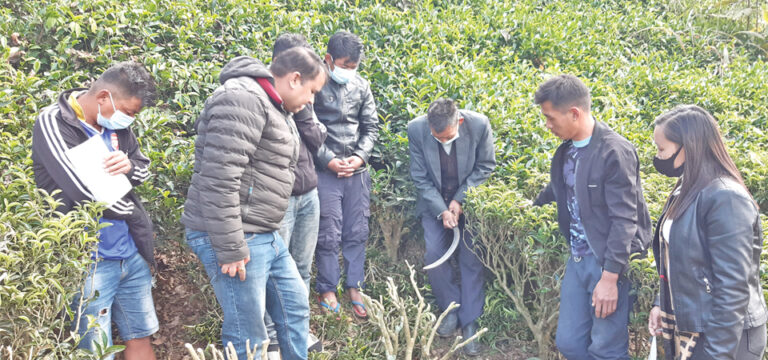
The National Tea and Coffee Development Board has started imparting training on tea harvesting to Ilam tea farmers from Friday under the ‘Sustainable Export Promotion Project of Nepali Tea’.
According to the Board, the project that runs with the participation of the Ministry of Industry, Commerce and Supplies and the Ministry of Agriculture and Livestock Development has started providing training as per the needs of farmers and seasons.
“Now is the time to harvest tea. Most of the tea estates have deteriorated due to mismatch of cutting. Farmers lack technical knowledge on how to manage gardens,” said Dr. Bishnu Prasad Bhattarai, executive director of the Board.
Bhattarai said, “We are now educating the farmers about the tea technology from the doorsteps of the farmers. Tea harvesting training has been given to the farmers till the end of tea harvesting.”
Tea was harvested from 11 places in Ilam on Friday. In the training, a group of 30 farmers has been formed and two skilled technicians have been assigned to each group. Tea harvesting training will be conducted in the estates of 2,790 farmers, said the Board. The project, which will be operational by April 2023, aims to train farmers in all aspects of their needs, such as what season tea should be made, fertiliser and picking and to produce organic quality tea.
Even the farmers are happy with the Rs. 178.2 million project started by the government as it is the first project for tea.
Until now, the government had not provided any assistance to the farmers for the expansion of tea.
Subash Chaurase, chairman of Sopan Tea Producers’ Cooperative in Suryoday Municipality, said, “This time a big project has come. We are happy, but like other projects, this project should not be completed without reaching the farmers.”
Chaurase said that farmers need organic medicine, subsidy in organic fertiliser and technical assistance to produce organic and quality tea.
The Board had earlier called on the tea industry and farmers involved in the project to participate in the project.
The project has been taken forward through the industries, organisations and farmers who are willing to participate in the project, said Bhattarai.
“There is no alternative to organic now. We have started the project to reach out to the farmers as organic is mandatory for export to third countries,” said Bhattarai
“The project is expected to help increase the export value of orthodox tea through a traceability system, sustainable improvement in the income of tea growers and increase investment in the tea sector and create more jobs,” he said.
Source : TRN,






